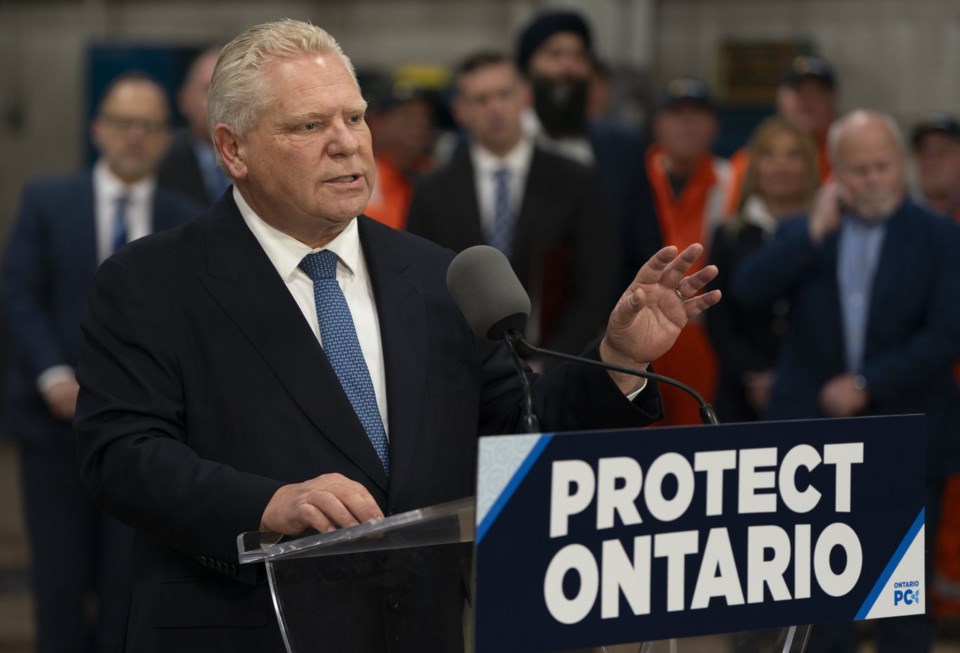OTTAWA — U.S. President Donald Trump has agreed not to impose tariffs on Canada and Mexico for another month, pulling back from a plan that would have tipped North America into a trade war on Tuesday.
Prime Minister Justin Trudeau spoke with Trump twice on Monday, their first discussions since the president took over the White House on Jan. 20. After what Trudeau described on social media as a "good call" in the afternoon, the two leaders agreed to pause tariffs for at least 30 days.
Trudeau released a statement on X that outlined the broad strokes of the $1.3-billion border plan his government had announced in December, adding that "nearly 10,000 front line personnel are and will be working to protect the border."
That mirrors the number of troops Mexican President Claudia Sheinbaum pledged to send to the U.S. border on Monday morning when she announced that she had secured a deal with Trump to delay the tariffs on her country by one month.
Trump signed a pair of executive orders on Saturday that laid out a plan to impose 25 per cent across-the-board tariffs on Mexico and 25 per cent tariffs on most Canadian goods, with a lower 10 per cent tariff on Canadian energy.
The executive orders say the levies are a response to illegal immigration and drug smuggling, and use the International Emergency Economic Powers Act to declare an economic emergency that allows Trump to bypass Congress.
The order related to Canada says Mexican cartels are operating in the country and claims the modest amount of fentanyl intercepted at the northern border would be enough to kill "9.5 million Americans."
Trudeau said Monday that Canada will list cartels as terrorist entities.
"I have also signed a new intelligence directive on organized crime and fentanyl and we will be backing it with $200 million," he said on X.
Canada plans to launch a joint strike force with the U.S. to combat organized crime, fentanyl trafficking and money laundering, and will appoint a "fentanyl czar" — though Trudeau gave no indication of what that job would entail.
The prime minister did not take questions from reporters on Monday.
Trump declared victory in a post on Truth Social, saying Canada agreed to "finally end the deadly scourge of drugs like Fentanyl that have been pouring into our Country, killing hundreds of thousands of Americans."
But his message ends with a warning that tariffs are not off the table.
"I am very pleased with this initial outcome, and the Tariffs announced on Saturday will be paused for a 30 day period to see whether or not a final Economic deal with Canada can be structured," Trump wrote, finishing with "FAIRNESS FOR ALL."
The 30-day pause does mean that Canada's counter-tariffs are also on hold. Several provinces were scrambling late in the day to reverse plans to implement non-tariff measures, such as barring the sale of American liquor and removing all U.S. alcohol.
Ottawa's retaliation plan was set to begin with an initial 25 per cent tariff on $30 billion in U.S. goods on Tuesday, with tariffs on another $125 billion worth of goods three weeks later.
The late-day news of a pause came after markets closed after a difficult Monday. Canada's main stock index, the S&P/TSX composite, was down nearly 300 points at the closing bell, while the loonie fell to its lowest level in more than two decades.
It also came after another day of shifting rhetoric from the White House.
Trump's stated rationale for the tariffs — the need to end the flow of drugs and migrants into the U.S. — is tied to the emergency order he signed, but he has also said he wants to end the U.S. trade deficit with Canada.
Between calls with Trudeau on Monday, Trump lamented to reporters in the Oval Office that Canada has been "very tough to deal with" and "very unfair."
When asked whether there was anything Trudeau could offer him to get him to back off the threat, Trump went back to another now-familiar line.
"What I'd like to see? Canada become our 51st state," he said, adding "we don't need them for anything."
This report by The Canadian Press was first published Feb. 3, 2025.
Sarah Ritchie, The Canadian Press



